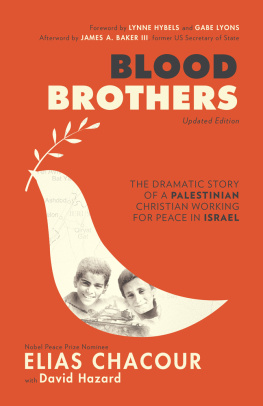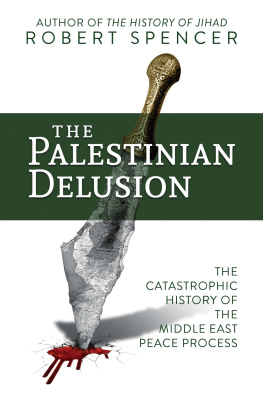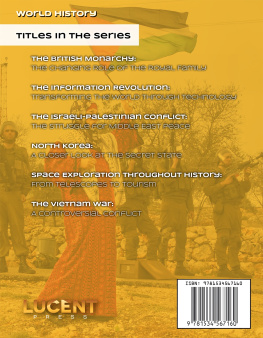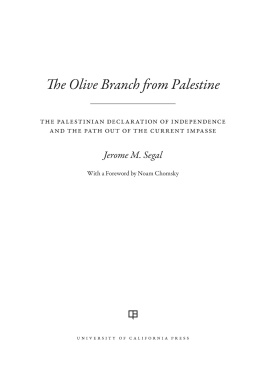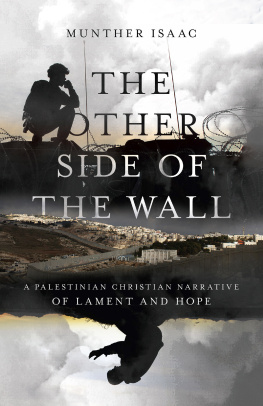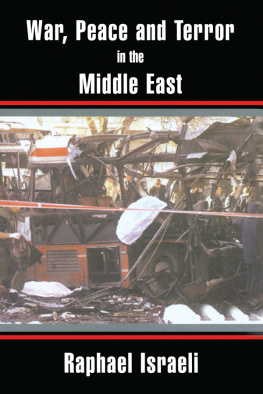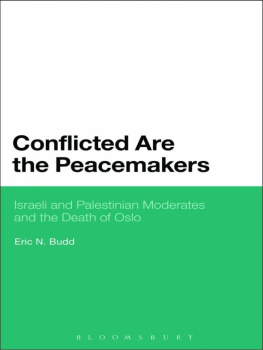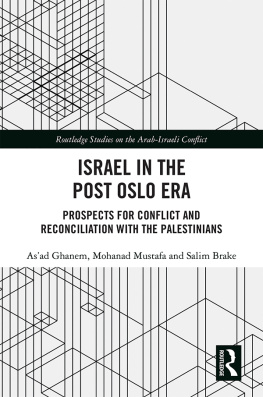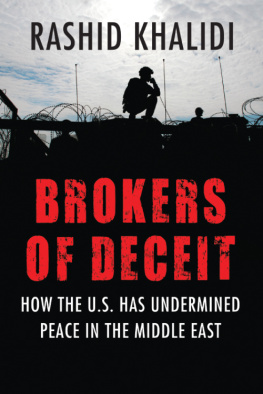1. News in the Wind
2. Treasures of the Heart
3. Swept Away
4. Singled Out
5. The Bread of Orphans
6. The Narrowing Way
7. The Outcasts
8. Seeds of Hope
9. Grafted In
10. Tough Miracles
11. Bridges or Walls?
12. Work, for the Night Is Coming
13. One Link
Afterword by James A. Baker III
Foreword
You can tell a lot from a mans face. The wrinkled lines and darkened skin, the glimmer in his eyeseven his beard tells a story.
We first heard this story on a warm afternoon on the hilltops overlooking the Galilean Sea. With thimble-sized acrylic coffee cups in hand, we leaned forward to listen to one of the wisest men weve ever met share the ongoing story of the Israeli-Palestinian relationship. A man who has lived it. Father Elias Chacour.
Born Palestinian and now an Israeli citizen, Father Chacour is a modern-day peacemaker. Leaders in both communities respect him, so there was no better person than he to help us wrestle with what we were encountering in the Holy Land.
Our travels to Israel brought us into direct contact with stories of those who built the modern State of Israel, of their hopes and dreams and struggles. We encountered a people seeking to overcome centuries of persecution by building something new in their historic homeland. And we met those who had recently suffered violence, telling stories of suicide bombings and rockets that fall indiscriminately on civilian populations.
But our travels to this beautiful area of the world revealed additional shocking truths we could never have anticipated. We learned of the dispossession of hundreds of thousands of Palestinians who live today as second-class citizens in Israel or under military occupation in the West Bank and Gaza. A shattered economy, land seizures and house demolitions, settlement expansion, Israeli-only roads networking through Palestinian land, and hundreds of military checkpointsall make daily life difficult and frustrating for Palestinians and fuel the hostility between Arabs and Jews.
What we didnt know was the role we, as American Christians, play in this story. Nor did we foresee how our deepening relationships with both Israelis and Palestinians would wedge us between competing theological positions.
Christians on one side believe that the modern State of Israel constitutes a divinely mandated return of ancient Israel to the Promised Land, and that it is directly connected to the second coming of Christ. This reasonable and thoughtful view often leads sincere Christians to a deep love and active support for the modern State of Israel.
Other Christians believe Jesus is the fulfillment of Gods promises to the Jewish people. This view emphasizes that Gods kingdom is a spiritual kingdom. They too love and honor the Jewish people as children of God, but they believe that end- times prophecies are too difficult to decipher with certainty and should not be used to condemn or justify the actions of modern states, including Israel.
Unfortunately, enthusiasts from both camps tend to caricature the other, making harsh political assumptions. If you support the State of Israel, says one camp, you must hate Arabs. The other says, If you talk about the plight of Palestinians, you must hate Israel. Far from being peacemakers, many Christians contribute to a polarized conversation that actually fuels the conflict.
Father Chacour calls us beyond that. Dont choose sides, he challenged us that day as we stood on the hilltop in Galilee. Learn what it means to be a common friend to both Arabs and Jews.
Throughout his long vocation of reconciliation, Father Chacour has found inspiration in the Beatitudes. Two thousand years after Jesus walked the Galilean hills, a diminutive Melkite priest and others like him still wrestleby deep necessitywith what it means to love our enemies and be peacemakers in a broken world. Entrusted with a seemingly impossible calling, Chacour chooses to follow Jesus every step of the way, and invites us to join him.
That invitation requires listening carefully to the incompatible and mutually exclusive narratives of Israelis and Palestinians, and affirming the compelling nature of both.
It means that we wholeheartedly support Israels existence as a place where Jews can live in freedom and security. We could not listen to the deep and legitimate fears of Israeli Jews, nor walk slowly through the halls of the Holocaust Memorial in Jerusalem, without being horrified by what the Jews have experienced. We long with them for the day they can live in peace and security. Followers of Jesus ought to be outspoken in their support of the right of Israeli civilians to live without being subjected to rocket fire and suicide attacks.
But we also wholeheartedly support equal freedom, security and dignity for Palestinians. We cannot listen to their stories of loss, displacement and ongoing oppression without longing for the day when their children can live with the same access to education, jobs, housing and mobility that we cherish for all children.
Like every compelling story, Father Chacours has a simple beginningand so provides a simple starting point for anyone seeking a deeper understanding of this Middle Eastern conflict. Blood Brothers , first published twenty-nine years ago, is a timeless story in desperate need of retelling today.
We pray that Father Chacours story will transform you as it has transformed us.
Lynne Hybels, co-founder of Willow Creek Community Church; author of Nice Girls Dont Change the World

